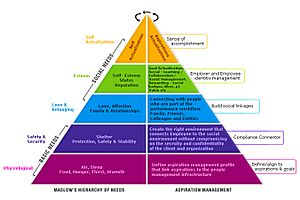Motivation facts for kids
Motivation is what makes us want to do things! It's the reason behind our actions, pushing us to work towards a goal. Think about it: when you're hungry, you want to eat. That feeling of hunger is a type of motivation. It's the inner push that makes you take action.
For animals, motivation is usually about basic needs. They are driven to find food, water, warmth, and safety. They also want to protect their young or defend their home. These actions are often instinctive, meaning they are born with these urges. Their actions are triggered by what's happening around them.
Humans also have these basic needs, like finding food or avoiding pain. But our motivation is much more complex! We can have long-term plans, like studying for a big test or saving up for something special. These goals need motivation that lasts a long time.
What Are Drives?
A drive is like an inner push or a strong desire. It comes from a need or something we are missing. This push then makes us act to reach a goal or get something we want.
Drives can come from inside us or from outside. For example, an external drive could be a reward, like getting praise for doing well. Even a simple smile or a frown from someone can be a subtle external drive for a young person.
Often, drives come from within us. We might feel a need to learn something new or to be creative. These inner drives don't always need outside encouragement to make us act.
How Emotions Connect to Motivation
Our feelings, or emotions, are closely linked to motivation. When we feel happy, sad, or excited, these emotions can make us want to do certain things. For example, feeling excited about a project can motivate you to work harder on it.
Images for kids
See also
 In Spanish: Motivación para niños
In Spanish: Motivación para niños
 | James Van Der Zee |
 | Alma Thomas |
 | Ellis Wilson |
 | Margaret Taylor-Burroughs |



